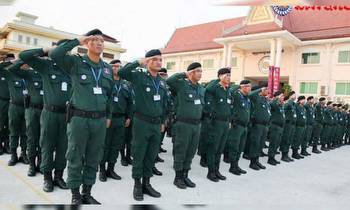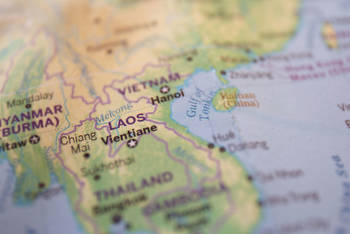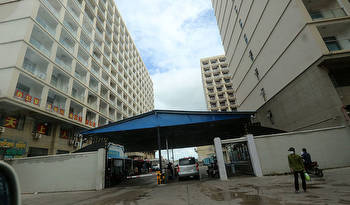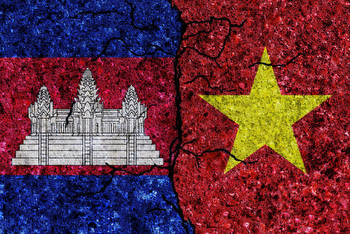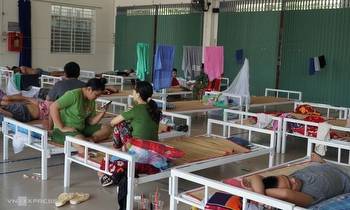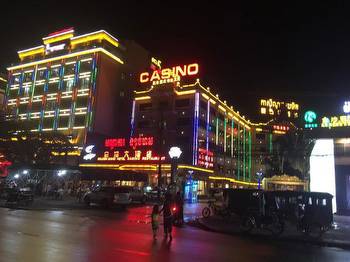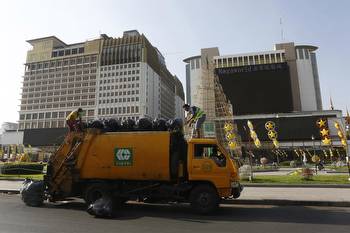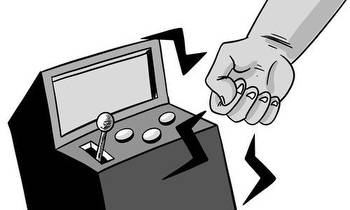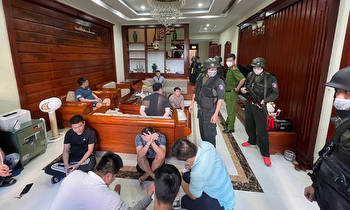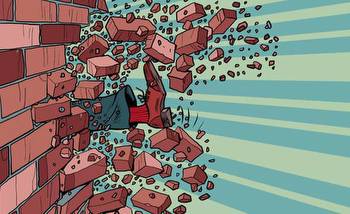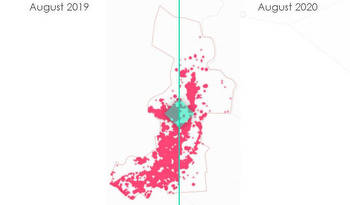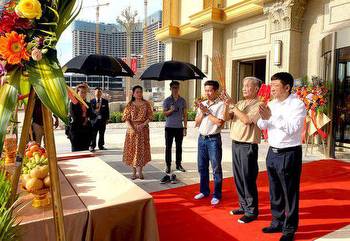Vietnamese parents buy back children from Cambodian casino mafia
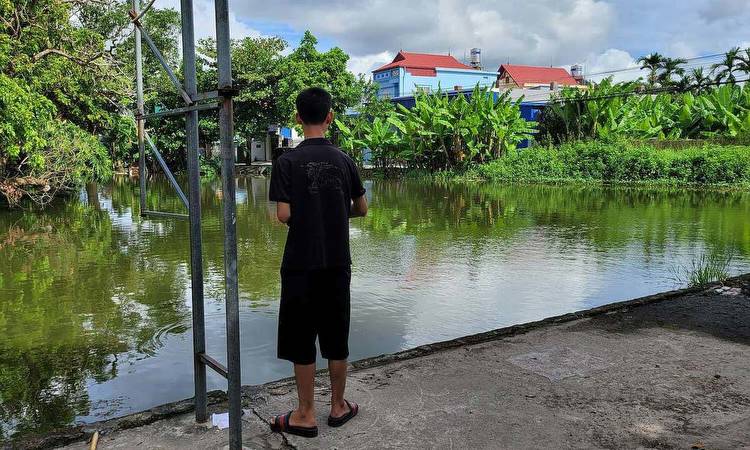
Four families in Hai Phong City visited Cambodia to pay thousands of dollars in ransom to get their children back after the latter were tricked and trafficked by an acquaintance.
Nguyen Tuan of An Duong District in Hai Phong learned late March that his teenage son wished to travel to Cambodia and work with his friends.
It was Nguyen Van Anh, 45, who recommended his son for the job.
"Anh is the father of Vu, a close friend of my son. He used to visit us at our home. He seemed to communicate well and care for the kids," said Tuan.
Tuan's son was one of four teenagers that tricked and sold to Cambodia by Anh.
The other three, also friends of Anh's son, were two boys and a girl.
According to Hai Phong police, Anh has a track record of crimes, having been jailed four times.
During his last stint in prison, he came in touch with two inmates nicknamed Vang and Cau, and met them again after his release in 2020. Then, they were working for a gang that smuggled people aged 18-40 to Cambodia for work, and offered intermediaries commissions for supplying unsuspecting victims.
Anh decided to join them and targeted a group of his son's friends, four teenagers aged 16-17.
He developed close relationships with the teenagers to the extent of offering to be their "adoptive father."
The teens had dropped out of school and wanted to find jobs to support their families. Anh exploited this desire to persuade them to go to Cambodia for work.
He told the four that a friend of his, based in Cambodia, was recruiting young workers and promised them salaries of VND18-20 million ($770-855) a month.
To make the story more convincing, Anh told his son's friends that both he and his son will also travel to Cambodia and work there.
The four teens and their families believed him completely.
On the night of March 30, Anh gathered the four in Trang Cat Ward of Hai Ai District and booked a cab to Nuoc Ngam bus station in Hanoi. He had the cab pick his son up halfway to Hanoi.
The next morning, Anh and the five teenagers traveled by car to Ho Chi Minh City. On reaching Ninh Binh Province, he told his son, Vu, that a relative had fallen sick and told him to return home immediately.
On April. 2, the group arrived at the Mien Dong (Southeastern) Bus Station in HCMC, from where Anh took them to Tay Ninh Province which borders Cambodia and stayed at a hotel for the night.
The next morning, a car came to the hotel to pick them to Cambodia. When it was about to reach the border gate, Anh said he'd left his HIV medicines at the hotel and had to go back for it.
As he left, a group of eight people approached the four teens and took them across the border illegally via a trail.
"When Anh left, we suspected that we'd been tricked but we did not dare to run away as we feared what those people could do to us," one of the boys recalled.
In Cambodia, they were taken to the Yong Yuan Casino in Sampeou Poun Commune of Kaoh Thom District, Kandal Province.
They were forced to work 12 hours a day at the casino. Their job was to advise customers at the casino on borrowing money via computer apps. They were paid $20 per day but the living conditions were "very poor," they said. If they failed to meet the target or did not work enough, they would be fined $2,000.
One of them said the four were beaten at times with the casino owners accusing them of helping others to escape.
After one week, the casino manager told the four that they'd been sold to the casino and were not allowed to go outside the facility's premises. Anyone who wanted to return home had to pay a ransom of at least $2,400 that the casino had "bought" them for.
The boys reached out to their families via a social media platform.
"I almost collapsed on learning that my son had been sold to Cambodia. Families of his friends also learned the news so we contacted each other to report the matter to the police and find ways to bring them home," said Mai, mother of one boy.
The four families then decided to have two fathers, Tuan and Lan, go to Cambodia and bring all four children back.
Lan knew someone who lived and worked in Cambodia and asked that person for help.
On April 21, the two men flew to HCMC and traveled to Cambodia by car.
Lan's acquaintance drove the two men to the Yong Yuan casino. They discovered that the casino was a place for online gambling and received no customers in person.
Tuan asked his son and the other three to go to a balcony in the building so that they could see each other.
After seeing his father, Tuan's son went to the casino's manager and offered to pay the ransom. The other three, however, were persuaded by the casino's owner to keep working there.
The manager demanded that Tuan paid $2,400 via bank transfer and promised to return the boy on April 22.
After Tuan arrived at the casino, the guard ordered him to stand far away from the gate and threatened to shoot him dead if he came closer.
A few minutes later, they took his son out. "I was so nervous and the scene was nothing different from movies about criminal gangs," Tuan said.
The manager demanded that he make the money transfer to an account named "Ngo Hong Hanh."
As long as the money was transferred, the boy was released. Tuan quickly took his son into the car and they left the casino in haste.
Lan and Tuan then moved to Phnom Penh, Cambodia's capital, and tried to talk the others into leaving the casino.
However, at that moment, several workers at the Yong Yuan casino tried to escape, so the owners decided to move many workers to another casino named Golden Phoenix Casino in Chrey Thom Commune, Koh Thom District, Kandal Province.
By then, the three other teens had agreed to go home, but Golden Phoenix said it had bought them from Yong Yuan so that ransom was $5,000 per person now.
Tuan and Lan contacted the families in Vietnam to get enough money for the ransom.
But the family of the only girl in the group, Phuong, did not have enough money.
"We were afraid that if we continued to wait, the situation would become worse, so we decided to pay the ransom for two boys and get them out first," said Lan.
As Lan and Tuan approached the Golden Phoenix casino, more than 20 armed men stood guard at the gate. Some of them carried swords.
Soon after $10,000 was transferred, Phuong was also released along with the two boys.
"We were very happy on seeing all three of them."
Soon after, they were informed that Anh and his gang were aware of their location. They realized that the four phones that Anh had given the teens had a tracking chip.
Tuan and Lan threw away the four phones and the group returned to Vietnam on April 25.
Lan said the four families had borrowed money and sold assets to pay the ransoms for their children.
The four teens reported their ordeal to the local police and filed a complaint against Nguyen Van Anh.
But even before their return, Anh had been arrested for carrying 400 grams of meth and 1,000 ecstasy pills in Quang Ninh Province that borders Hai Phong.
Colonel Khong Ngoc Oanh of the Ministry of Public Security said at a meeting in Hanoi last week that thousands of people could have been trafficked to Cambodia "to be exploited." Rescuing them would be difficult, Oanh said.
Most trafficked workers were promised "easy jobs with high wages" only to be taken to casinos and production facilities where they were virtually held prisoners, he said.
Recently, one teenager, a 16-year-old boy, drowned while trying to escape from the Golden Phoenix casino by swimming across a river to reach Vietnam's An Giang Province.
He was among 42 Vietnamese who tried to escape. Forty succeeded and one was recaptured by the casino.
Cambodian police have completed procedures to repatriate another 25 Vietnamese tricked into working for Cambodian casinos, including the one who was recaptured.
In the first half of this year, Vietnamese police in cooperation with Cambodian authorities have managed to rescue over 250 people trafficked to the neighboring country.
*Names of the victims and their family members have been changed.










